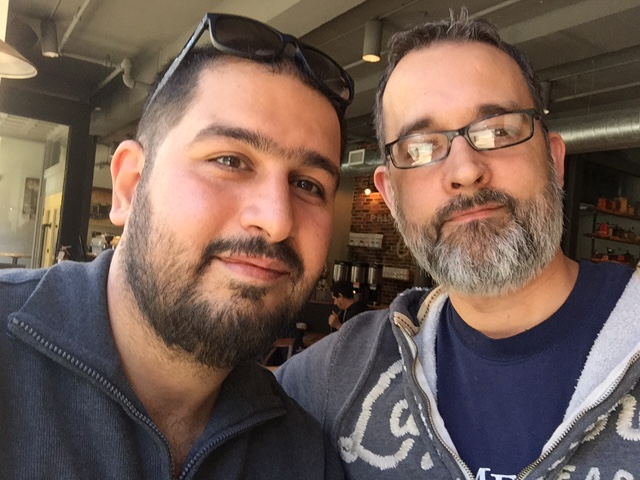
I sit in my car on an unseasonably warm day in November, and I’m across the street from CWS. Church World Service. They work with partners to give hope, opportunity, and relief to refugees and immigrants relocated to central Pennsylvania. I sit there across the street from their office and stare at the golden leaves. The days are shorter now. The darkness comes early.
I walk across the street and into the lobby, into the chaos of people trying to find their way in a new place. There are people from every country you could imagine there, some speaking to each other in languages I don’t understand, some waiting quietly, pensively. One man talks on the phone, urgently, looking at a small piece of paper and reading numbers into the receiver. I spot my friend, the man who will interpret for me, and he smiles. He stands up. We shake hands. It is good to see him again.
We aren’t there long before my friend from CWS comes out to retrieve us. We follow her through a maze of offices and hallways, corridors and meeting rooms. She tells us of their expansion plans. She is clearly excited for what it means for CWS, the extra space, the added capacity. We sit in a conference room, on a sofa, and we wait.
I can’t tell you the details of the story I hear, not yet, but trust me when I say you cannot sit on a sofa with a refugee from a war-torn country and walk out into that fall day unchanged. If you would take the time to listen to their stories, these beautiful, strong, persevering people, you would see there are common things to be found in all of them. Not the details – those are always different, always varied. The common things you find are these.
They always look older than they are.
There is a kind of softness worn into their eyes, a sadness that tells you they have seen many things, and a glint like light on metal.
There is a strength and determination somewhere around the shoulders, a bent-but-not-broken arch in their spine.
There is a childlike eagerness to make new friends – sometimes you have to work to see it, but it’s there.
I thank the man before we begin our meeting for the courage it must take for him to share his story in a strange country, when he does not know what this story-telling might lead to. I thank him for his willingness to explore the possibility of writing a book with me. I tell him not to get his hopes up – book writing and publishing are no sure thing, and it may very well be that nothing will come of our time together.
My translator tells the man what I say. The man smiles and nods and answers in Arabic. My translator nods, smiles also, then turns to me.
“He says, It is impossible for nothing to come of this. He is glad you are willing to hear his story, and no matter what happens, you are friends now. That is all that matters.”
Indeed. If only I were so quick to call people “friend.”
Maybe, in times such as this, listening to each other is the first and most important step.

Maybe your title should have been “It is impossible for nothing to come of this” It seemed to jump off the page when I read it. I hope this book writing works out. The mans statement would be very much fulfilled.
Yes I agree Brian, everyone has a life story to tell, friends are a gift from God ,great write up thanks happy thanksgiving to all ,we have much to thank our God for .
You live an amazing life, Mr. Shawn!
Thank you for doing this important work of bringing their stories to us!
Beautiful and powerful. Prayers for God’s blessing and will with this project.
I have many friends who are urban refugees where I live in Kathmandu, Nepal. (The government here does not recognize refugees so they are basically illegal immigrants the UNHCR is trying to get resettled somewhere more welcoming, a task that has obviously grown more difficult in the past couple of years). I love these observations… They are true of my friends too. And the attitude of your new friend seems typical, no matter the cultural background or horror story. If you listen with a sincere desire to understand, you are instantly a friend.